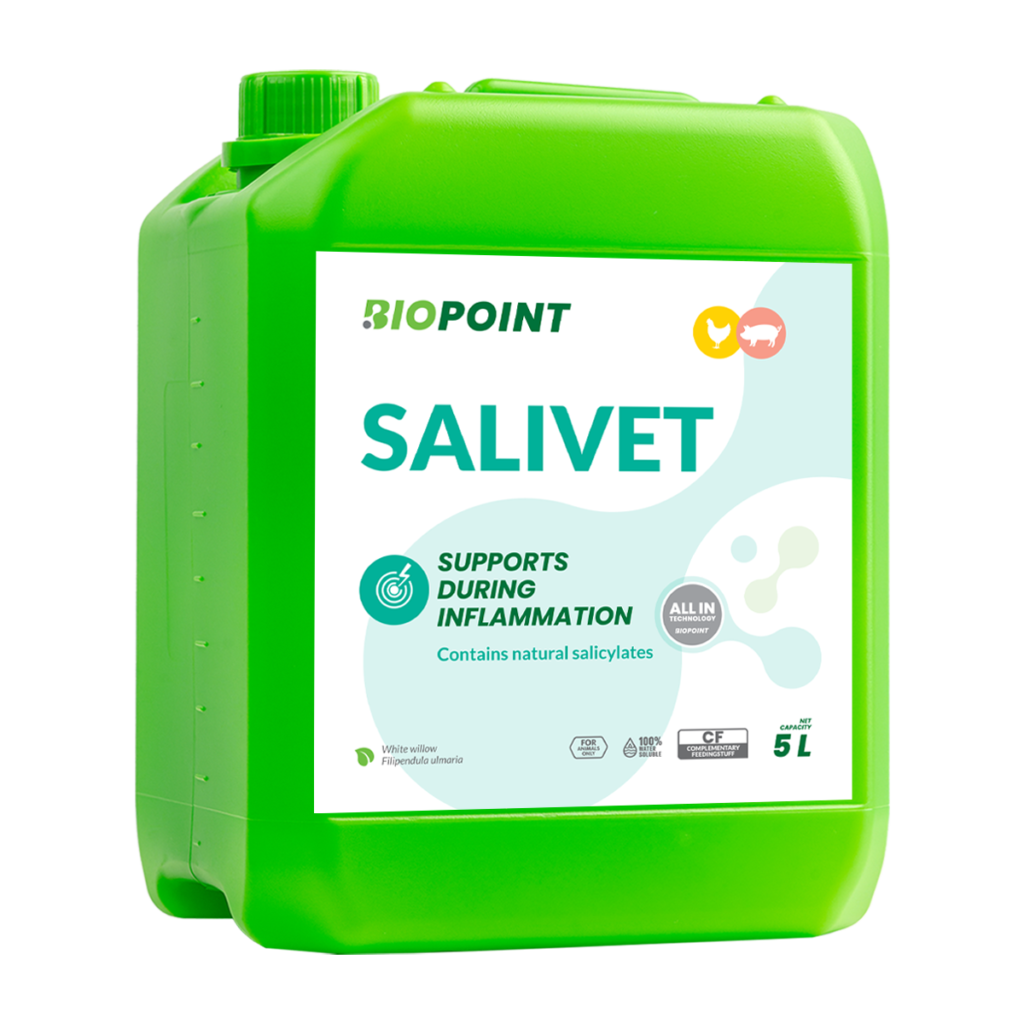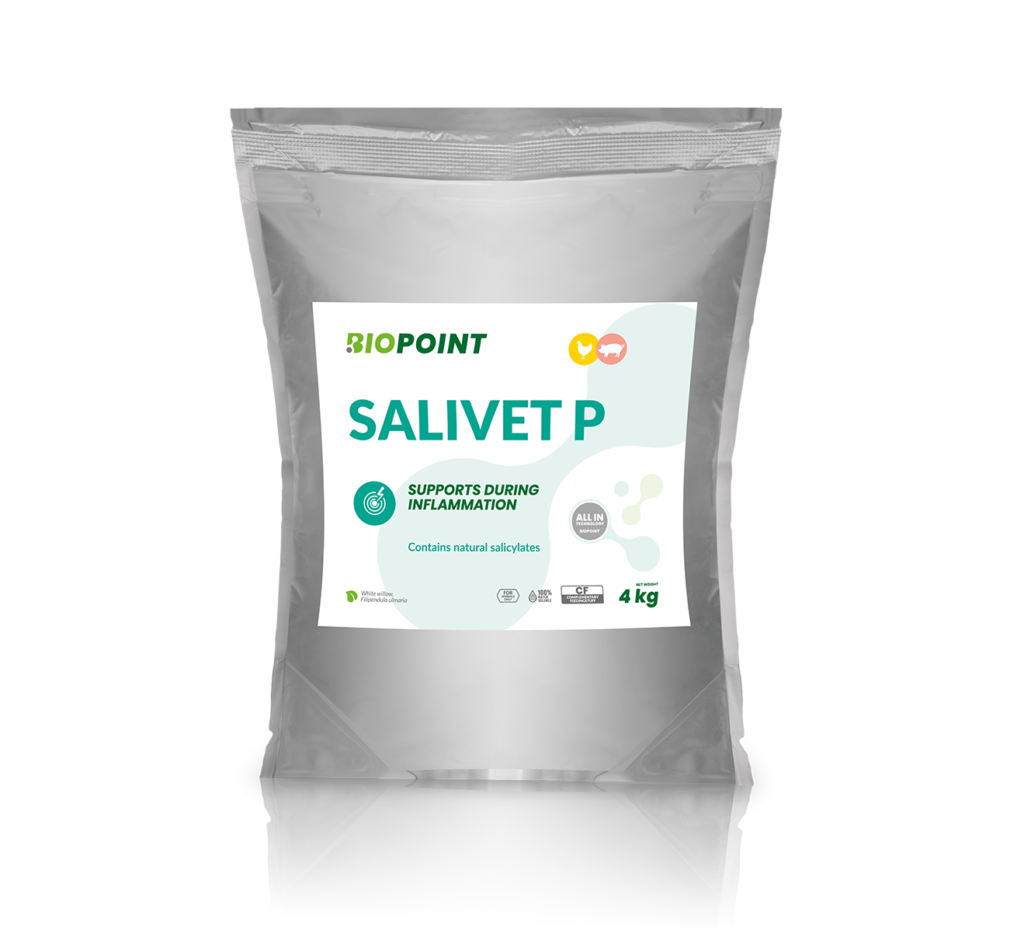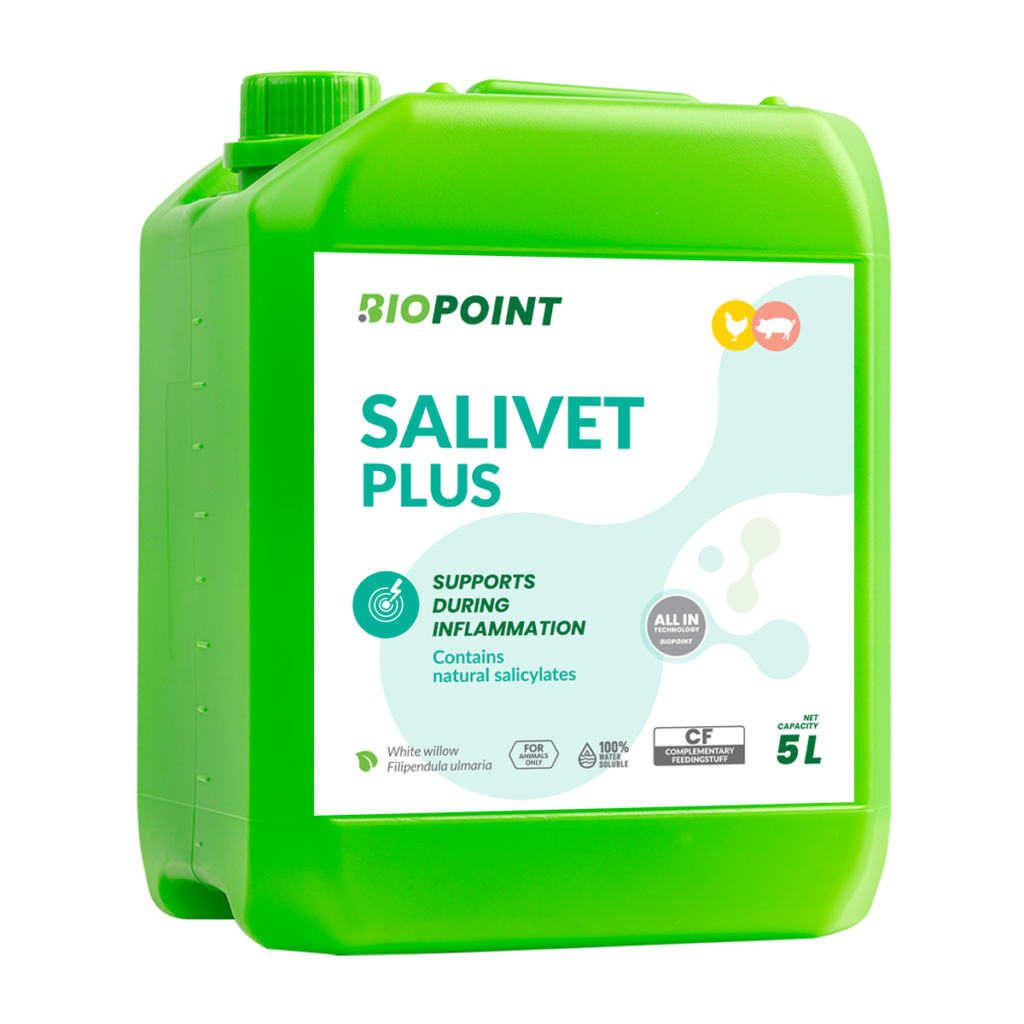
Inflammatory conditions – Pigs
Ask about the product
BioPoint - support for pigs during inflammation
In the agricultural sector, especially within swine production, inflammation stands as a significant challenge that can drastically affect the health and productivity of livestock. BioPoint, a leader in the development of feed additives and mixtures, recognizes the impact of inflammatory conditions and is dedicated to providing solutions that not only address these issues but also enhance the overall well-being of swine herds. This article delves into the various aspects of inflammatory conditions, from understanding and prevention to innovative treatment options offered by BioPoint.
Understanding Inflammatory Conditions in Swine Production
Inflammatory conditions in swine can lead to serious health issues, impacting everything from growth rates to reproduction efficiency. These conditions typically manifest as part of the animal's immune response to pathogens, environmental stressors, or poor management practices. Understanding the underlying mechanisms of inflammation is crucial for developing effective management and treatment strategies. BioPoint focuses on educating farmers about these mechanisms, providing them with the knowledge needed to identify and mitigate potential risks before they escalate into more severe problems.
Early Detection of Inflammatory Symptoms: Key strategies for recognizing early signs to implement corrective measures swiftly.
Detecting inflammatory symptoms early is vital for maintaining the health of swine populations. Early signs of inflammation might include lethargy, reduced appetite, and abnormal swelling or redness in specific body parts. BioPoint advocates for regular health checks and the use of precision farming technologies that can alert farmers to these symptoms at an early stage. Swift action can then be taken to address these issues, potentially saving costs on treatments and reducing the spread of disease within the herd.
Importance of Preventive Measures: Emphasizing the role of high-quality living conditions in preventing inflammation.
Preventing inflammation is equally as important as treating it. BioPoint stresses the importance of maintaining high-quality living conditions as a preventive measure. This includes ensuring proper ventilation, adequate space, and optimal hygiene within pig housing. Preventive nutrition, another critical factor, involves the use of specialized feed additives that enhance the immune system's ability to ward off inflammatory responses before they become problematic.
Causes of Inflammation in Swine
The causes of inflammation in swine are multifaceted, stemming from various sources such as bacterial infections, physical injuries, or the stress associated with overcrowding and poor farm management. Understanding these causes helps in formulating effective preventive strategies. BioPoint's research into these causative factors allows them to develop feed additives that help mitigate these risks by boosting the overall health and resilience of the swine.
Infectious and Non-Infectious Origins: Discussing how both infectious diseases and stress can trigger inflammatory responses.
Inflammatory conditions in swine can arise from both infectious and non-infectious origins. Pathogens like bacteria and viruses are common infectious agents that cause inflammation. However, non-infectious factors such as stress from environmental conditions or nutritional deficiencies also play a significant role. BioPoint's approach includes comprehensive health management practices that address both types of causes, thereby reducing the incidence of inflammation and improving animal welfare.
Impact of Intensive Farming Practices: Exploring how modern intensive farming methods can contribute to increased inflammation risks.
Intensive farming practices, while efficient, can increase the risk of inflammation in swine by creating environments that are conducive to the spread of disease and stress. Crowded conditions can lead to higher stress levels, weakened immune systems, and increased susceptibility to inflammatory diseases. BioPoint advises on farm management practices that balance productivity with animal health, including the implementation of better housing, regular health monitoring, and stress reduction techniques.
Preventive Strategies Against Inflammation at BioPoint
BioPoint has developed a range of preventive strategies to tackle inflammation in swine, emphasizing the use of advanced feed formulations and comprehensive farm management practices. These strategies are designed to enhance the immune system of the animals and reduce the factors that contribute to inflammation. By implementing a holistic approach that combines nutrition, environment, and health monitoring, BioPoint helps farmers maintain the health and productivity of their livestock, ensuring that preventive measures are both effective and sustainable.
Hygiene and Biosecurity Measures: The critical role of cleanliness and pathogen control in reducing inflammatory conditions.
Hygiene and biosecurity are pillars of BioPoint’s strategy to prevent inflammation in swine herds. Strict protocols for cleanliness and disinfection are recommended to prevent the entry and spread of infectious agents that can cause inflammation. BioPoint advises on regular cleaning schedules, proper waste disposal, and the isolation of sick animals as part of an effective biosecurity plan. These measures are crucial in maintaining a healthy farm environment and minimizing the risk of disease outbreaks.
Nutritional Management: How BioPoint's feed additives can strengthen immune responses and reduce inflammation susceptibility.
BioPoint places a strong emphasis on nutritional management to prevent inflammation. Their feed additives are enriched with natural ingredients known to boost the immune system and reduce inflammatory responses, such as antioxidants and omega-3 fatty acids. By improving the nutritional quality of swine diets, BioPoint aids in building a robust immune system that can more effectively resist and manage inflammatory challenges. This approach not only improves animal welfare but also enhances the overall productivity of the farm.
The Role of Natural Salicylates in Managing Inflammation
Natural salicylates, derived from plants such as willow bark, play a significant role in BioPoint's strategy to manage and treat inflammation in swine. These compounds have proven anti-inflammatory and analgesic properties, making them an integral part of the dietary supplements developed by BioPoint. By incorporating natural salicylates into swine diets, BioPoint aims to provide a non-pharmaceutical approach to managing pain and inflammation, reducing the reliance on synthetic drugs which can have undesirable side effects.
Anti-Inflammatory Properties of Salicylates: Exploring the benefits of using natural salicylates in feed to reduce inflammation.
The anti-inflammatory properties of salicylates are central to their effectiveness in treating inflammatory conditions in swine. These natural compounds help to reduce swelling, pain, and fever, typically associated with inflammation. BioPoint harnesses these properties to formulate feed additives that not only treat but also prevent the onset of inflammation. By doing so, they improve the quality of life for the animals and prevent the escalation of minor ailments into more serious health issues.
Pain Management with Salicylates: How salicylates can also aid in managing pain associated with inflammatory conditions.
In addition to their anti-inflammatory effects, salicylates also provide significant pain relief, which is crucial for the welfare of swine suffering from inflammatory conditions. BioPoint's use of salicylates in feed ensures that swine are more comfortable and less stressed, which in turn can lead to improved growth and productivity. This approach aligns with the ethical treatment practices that are increasingly demanded by consumers and regulatory bodies, making it a key component of modern swine management.
Practical Application of Salicylates in Swine Diets
The practical application of salicylates in swine diets represents a significant advancement in the management of inflammation. BioPoint has developed specific protocols for integrating these natural compounds into regular feeding programs. This includes determining optimal dosages that provide the maximum therapeutic benefits without compromising animal health or productivity. By effectively integrating salicylates into swine diets, BioPoint ensures that the animals receive consistent and effective relief from inflammation and pain, enhancing their overall health and well-being.
Incorporating Salicylates in Feed: Techniques for integrating natural salicylates into swine diets effectively.
Integrating salicylates into swine feed requires a nuanced understanding of animal nutrition and the specific needs of swine at different stages of growth. BioPoint employs advanced techniques to ensure that salicylates are evenly distributed throughout the feed and absorbed efficiently by the animals. These techniques include microencapsulation, which protects the salicylates from degradation during digestion, ensuring that their therapeutic properties are effectively utilized by the animal’s body.
Comprehensive Approach to Inflammation Management
BioPoint adopts a comprehensive approach to inflammation management, combining preventative measures with effective treatment options. This holistic strategy involves not only the use of salicylates but also the implementation of environmental and managerial practices that reduce stress and disease exposure. By addressing inflammation from multiple angles, BioPoint helps to ensure that swine producers can maintain healthy herds, reduce the incidence of disease, and improve the overall efficiency of their operations.
Combining Prevention with Treatment: Strategies for using both preventive measures and effective treatments like salicylates to manage inflammation.
Effective inflammation management requires a balance between prevention and treatment. BioPoint’s approach focuses on this balance by enhancing feed with salicylates while also promoting practices that reduce the likelihood of inflammation. This includes optimizing housing conditions, improving hygiene practices, and managing stress levels within the herd. By combining these preventive measures with the targeted use of salicylates, BioPoint maximizes the health and productivity of swine herds.
Future Prospects and Innovations at BioPoint: Discussing future research directions and potential new products for better inflammation management in swine.
Looking forward, BioPoint is committed to continuous innovation in the field of swine health management. The company invests in ongoing research to explore new natural compounds and develop more effective formulations for managing inflammation. Future prospects include the development of next-generation feed additives that offer enhanced bioavailability and efficacy. BioPoint also plans to expand its research into the genetic factors that influence inflammation response in swine, aiming to provide even more personalized and effective solutions.
Summary
In conclusion, managing inflammatory conditions in swine production is crucial for ensuring the health and productivity of herds. BioPoint’s integrated approach, which combines cutting-edge nutritional science with practical farm management techniques, offers a sustainable and effective solution to this challenge. Through continuous research and innovation, BioPoint is setting new standards in animal health, ultimately contributing to more profitable and ethical swine production practices.


